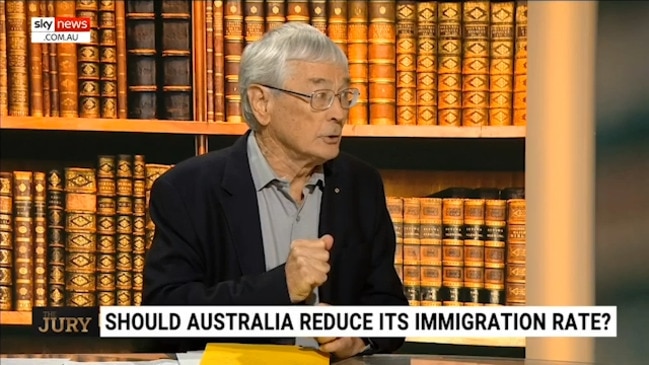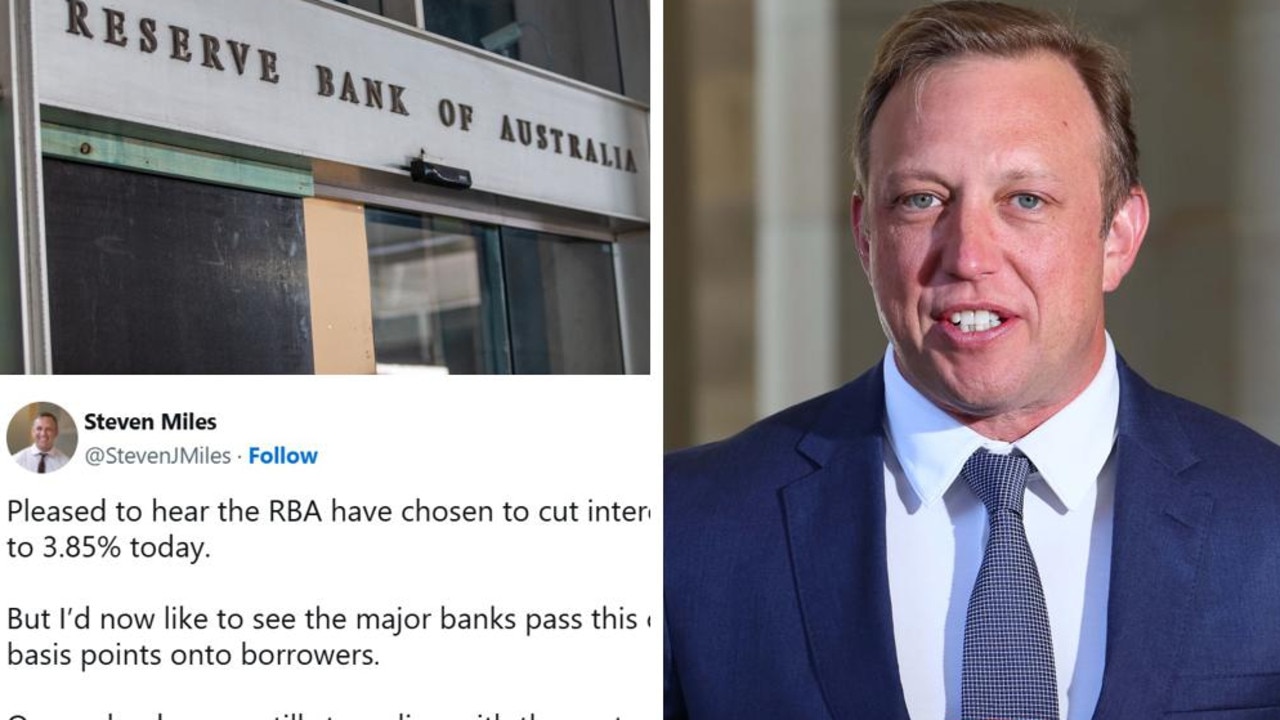‘No one believes 100 million is sensible’: Dick Smith clashes with Emilie Dye over immigration numbers
Outspoken businessman Dick Smith clashed on TV with a policy analyst who argued “we can’t blame immigrants” for Australia’s housing crisis.

Economy
Don't miss out on the headlines from Economy. Followed categories will be added to My News.
Dick Smith has claimed that the “prime reason” for Australia’s high house prices is its “huge population increase” as he reiterated calls to slash immigration to just 75,000 people per year.
In a debate on Sky News Australia on Sunday, the entrepreneur and businessman clashed with Emilie Dye, policy analyst at the Centre for Independent Studies (CIS) think tank, who insisted that “we can’t blame immigrants” for the housing crisis.
Australia brought in a record half a million migrants in 2022-23 and the population — which last month officially ticked over 27 million — is expected to nearly double in the next 50 years.
“We can [continue on that trajectory] but it won’t be good for normal people,” Mr Smith said.
“It will be great for the wealthy, they will make even more money. Our billionaires have doubled their wealth in five years, they’ll keep being wealthier. The figures are actually worse — at the present growth rate, from the huge immigration, we’re going to end up at 100 million people in Australia when our grandkids will still be alive at the end of this century. No one believes 100 million is sensible for an arid country like Australia.”
Mr Smith, who has been one of the most prominent public figures calling for a reduction in Australia’s immigration numbers for several years, said the “figure should be about 75,000 a year” in line with the long-term average for most of the country’s history up until around the 1990s.
“I am pro-immigration, I think it’s really fantastic, but 75,000 a year will round off our population at about 30 million, and that sounds a pretty sensible number to me,” he said. “Having more people normally means you’re spreading the wealth and that with more people everyone gets less.”

But Ms Dye hit back, “I don’t think that it is a finite number of resources, I think that immigrants are adding value. I think it’s really easy to look at immigration and say, ‘Oh, immigrants are taking — they’re taking our jobs, they’re taking our houses.’ But in reality it doesn’t work that way.”
She argued that “for every job that an immigrant takes they’re also creating jobs, they’re both consuming and they’re creating their own businesses”.
“Immigrants tend to be incredibly entrepreneurial, they’re adding back to the country,” she said.
“They’re the ones that are often working on construction crews, building those houses, so it’s easy to blame immigrants for policy failures, for issues like housing affordability, but when it comes down to it, in general, immigrants are just adding to our society and making us richer — making us all richer, not just the people at the top.”
Host Danica De Giorgio pointed out that critics have often branded the mass immigration policy a “Ponzi scheme” used to artificially inflate GDP.
“I think that it’s not propping up [the GDP] if they’re adding real value,” Ms Dye said.
“It’s not fake value, it’s not fake money that’s coming into this country. These are real people, these are real businesses, these are real people that are doing real jobs and coming up with ideas, increasing our productivity, being entrepreneurs.”
She claimed immigrants “tend to be the most entrepreneurial people out there because they’re at a disadvantage when they come to this country, they don’t necessarily have the connections … so they often end up being the ones that start those businesses”.

Mr Smith countered that Australia was no longer a manufacturing country like China, and that most of its wealth comes from exporting minerals and primary industry.
“And you don’t actually need a lot more people to do that,” he said. “My belief is double the number of people in the country and most people are worth half as much.”
He cited the similar example of Norway, which has a population of five million, and makes most of its money selling oil and gas.
“Their GDP per head is a third more than ours,” he said.
“That’s sensible. Every Australian family has a population plan. They don’t have 20 kids, they have the number of kids they can give a good life to. Our politicians should have the number of people in Australia we can give a good life to. That’s not happening at the moment — young people can’t afford a house, you’re in traffic gridlock, things are getting worse and worse.”
He also rejected the suggestion that high immigration was needed due to the skills shortage.
“With half a million people out of work we should be able to train people,” he said.
Ms Dye stressed that “we can’t blame immigrants for the housing policy issues and the housing crisis”.
“That is not the fault of immigrants, that’s not the fault of people who are having babies, either,” she said.
“We have people, we should be providing for those people, and we’re just blaming the victim if we’re saying, ‘Our population’s too high, that’s why we can’t house people.’ That’s a political ploy to take the heat off of the politicians that have decades of poor housing policy, have restricted the supply of housing. And even the reduction in immigration over Covid impacted our housing supply because we didn’t have enough people to build houses. So really we’d just be shooting ourselves in the foot and for what? A political ploy, really.”

Mr Smith replied, “The prime reason for high housing prices is the huge population increase. We’re not blaming anyone, it’s just a fact that if in a marketplace you bring in an incredible amount of people wanting to purchase houses, you’re going to put the price up, and that’s what’s happened. I’ve benefited from growth, without any doubt, but what I’m concerned about is my grandchildren.”
Research late last year revealed Australians now need to earn more than $300,000 a year to comfortably afford to buy their own home.
At the same time, rental supply and vacancy rates are at record lows as fierce competition continues to drive up prices.
Economist Chris Richardson told QandA in November the easiest way to ease pressure on the market would be to temporarily cut back on the number of international students, who made up the bulk of the 518,000 net overseas arrivals last year.
AMP head of investment strategy and chief economist Shane Oliver has also previously called for lower immigration to address housing affordability, saying “the role of high immigration levels can’t be ignored”.
“On our estimates it needs to be cut back to nearer 200,000 people a year to better line up with building industry capacity and to reduce the chronic housing supply shortfall,” he said in a September note.
But PropTrack senior economist Paul Ryan told news.com.au last week that while migration had “definitely been a component of housing demand”, the “emphasis on immigration has been a little too strong relative to its impact on housing affordability more broadly”.
“We’re really seeing strong net immigration now because we’re not seeing the outflows [we normally would], because no one entered the country during Covid,” he said.
“We have been a high migration country for several decades now, before the pandemic we had a long period of flat rents while we had strong migration. Migration is one component of housing demand, but it wouldn’t even be close to the biggest driver of housing affordability compared to mortgage rates.”
Sky News is seeking applicants to form the Jury members on its new show The Jury. To register your interest, email audience@skynews.com.au with your details. The Jury is filmed in Sydney.
Originally published as ‘No one believes 100 million is sensible’: Dick Smith clashes with Emilie Dye over immigration numbers




